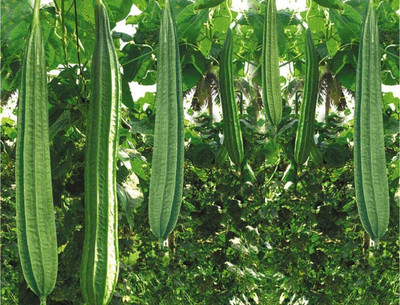golden hills farm High Yield Ridge Gourd Seed, Turai, Tura Luffa, Jhinga Vegetable Seed(60 per packet)
Quick Overview
Product Price Comparison
Soil Preparation :- Ridge gourd can be grown in wide variety of soils. But it grows best in sandy loamy soils. The soil or main field should be prepared thoroughly by 4 to 5 ploughings and soil pH range from 6.5 to 7.5 is ideal for Ridge gourd cultivation. This vegetable crop requires good drainage. Better yield and quality of vegetable can be expected by applying organic matter or Farm Yield Manure (FMY). Seed Treatment Before sowing, seeds should be treated with Pseudomonas fluorescens 10 grams or Trichoderma viride 4 grams / kg of seeds. Seed Sowing The Ridge gourd seed is sowing time depends on the type of crop. Usually Ridge gourd Plantation spreads during January and July. Seed Rate An average seed rate in Ridge gourd farming is about 5 kg to 6 kg / ha. Methods of Sowing and Spacing The Ridge gourd seeds are sown by dibbling method at 1.5 m to 2.0 m X 1.0 m to 1.5 m. Sow 3 seeds in each pit. After germination, thin to 2 healthy seedlings. The seeds also can be sown in poly bags. 2 seeds per bag is ideal and 2 weeks after germination, they can be planted at 2 seedlings per pit in the main field. Intercultural Operation During the early stage of plant growth, shallow cultivation is preferred. The plants should be provided a suitable support made of bamboo sticks for better creeping. Manure and Fertilizers 40 to 50 cartload well decomposed Farm Yard Manure should be applied at the time of soil or field preparation. Apply a fertilizer dose of 250:100:100 kg NPK / ha throughout the Ridge gourd cropping period through split application. Irrigation/Water Supply Water the basin before dibbling the seeds and afterwards, once in a week. Drip watering is most beneficial in the Ridge gourd cultivation. The summer plantation requires frequent watering at an interval of 3 to 4 days. Normally rainy season crop does not require any irrigation.


